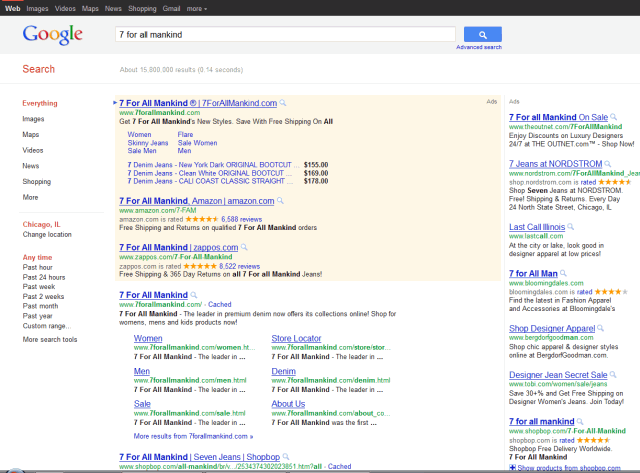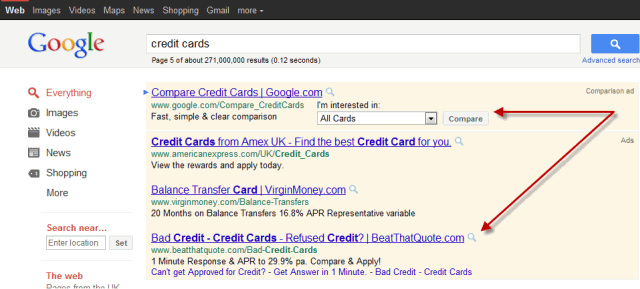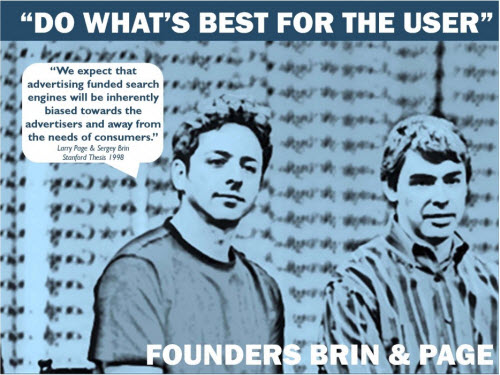Endless AdWords Profits
"To thine own self be true"
In a word?
Prescient!

10 links in a single AdWords ad unit!
Then more ads below it. Then a single organic listing with huge sublinks too. And unless you have a huge monitor at that point you are "below the fold."
Negative advertising in AdWords is not allowed. So long as you build enough brand signals & pay the Google toll booth, public relations issues & reputation issues won't be accessible to searchers unless they learn to skip over the first screen of search results.
While it is generally against Google's TOS for advertisers to double dip in AdWords (outside of the official prescribed oversize ad units highlighted above), Google is doing exactly that with their multitude of brands.
BeatThatQuote is back yet again.

The line between ads & content is getting blurry. Mighty blurry.

Is it time yet for a new slogan?
Google: the sales engine!





Comments
Google might have had an ethical side back in the early days. but once Eric was in and Google started generating revenue, I don't think there has been much turning away from that stage. Take double click. now all ad experimentation. It's all money obviously. Google is an advertising company that has a cool search engine and few other products that it uses to advertise. that's all.
What's the name for a parasite that slowly kills the host?
Google only care about pleasing their shareholders. Search is their main income, and the only way they can grow is to physically grow the adspace, and that is what we are seeing. They're going to hit a wall eventually though where people simply get fed up with a lack of choice in the SERPs.
Aaron, I think you should get some of your screenshots out to Congressmen this week before they grill Google this week in the Antitrust hearings. I think Google's strategy is force pay to play by filling in the top fold real estate all they can. This will work only until a better search solution challenges them. Playing monopoly and asking for social currency for the Facebook challenge present a tension for them (or will). Get a congressman to call you forward please.
It seems to me that the adwords certification material was updated since last year to include the last two types of sites of the four listed below. I don't recall them being there before.
This is straight from the Google material:
"
Types of Websites That Receive Low Landing Page Quality Scores
Website types to advertise with caution
The following website types will sometimes merit low landing page quality scores and may be difficult to advertise affordably. If you choose to advertise one of these website types, be particularly careful to adhere to our landing page quality guidelines -- especially the rule about offering unique content.
eBook sites
"Get rich quick" sites
Comparison shopping sites
Travel aggregators
"
http://adwords.google.com/support/aw/bin/static.py?hl=en&topic=23689&gui...
How "odd" that what appear to be two new additions to Google's AdWords guidelines on sites to advertise with caution are also the two industries that have CEOs testifying in the Google antitrust case.
The CEO of Nextag(comparison shopping sites) and the legal counsel to Expedia(travel aggregators) are testifying tomorrow at the Google antitrust hearing.
...is why do they have a "get rich quick" ad category for AdSense publishers if they view those advertisers as providing a poor user experience & have labeled them as "schemes promising fast earnings" when you scroll over the category name?
We should know by now that the answer to these questions is always "money".
Just like they will permanently (as in, FOREVER) kick you out of Adwords if they feel you are using "arbitrage" but their results are still full of Ask.com results.
They will also kick you out of Adwords (or at least disallow your ads) if you are using a "thin" landing page, but you can make just about any local search and end up on a Groupon ad that has nothing but an "enter your email" form and NOTHING else on the page.
Google says, "act like big brands while big brands can do whatever the F they want" (as long as they're not competition)
The new adWords beta's Google's experimenting with are more ways to highlight the paid listing vs organic listings to increase paid ad CTRs. What's bothering me the most is that the beta's will only apply to ads that are in the top 3 positions, which means this will increase the competition for the premium positions. When competition increases, it makes it harder for small businesses to compete AND their account will have lower quality score because of it. Google says they normalize CTR but I have evidence that suggests otherwise. The PPC landscape is becoming more gloomy by the day.
In mature markets I think they have calculated the optimal yield & realize their profits will be greater if they kill off a number of the weaker hands. Obviously their love of brand, their pushing of display ads, and their blind hatred toward affiliates reflects that, but one other way to see this is trying to set up ad campaigns for some small(ish) local businesses in smaller towns.
In many cases they will simply tell you that there isn't enough volume for the ads to run. It wouldn't be worth their time (er, computer cock cycles & ad space) to take you on as an AdWords customer. A couple months ago I tried setting up an AdWords campaign for a friend's business (in a town of about 5,000 people) & the answer from Google was "no dice."
The only solutions to that then are to attempt to build an organic traffic stream outside of AdWords, to buy traffic from one of the larger vertical networks that acts as a glorified AdWords reseller, or to buy ads for a broader area & hope that the money you burn on the irrelevant ads isn't so much that it kills off all the profits from advertising where you are relevant.
It is interesting that Google's initial strengths were relevancy & having an ad platform that is open to just about anyone. But as they have become much more like television (video ads, display ads, general bias toward brands) they have left out a lot of the small players who helped build them.
At some point Google will end up having to back off on some of the brand bias stuff. It can't be a longterm solution, because if they keep subsidizing the largest market leaders & consolidating markets then eventually some of those market leaders will start pulling ad budget, viewing it as an unneeded expense rather than an investment. This is doubly true where the brand bias is so potent that it locks up markets so aggressively that it flat out kills off innovation in the associated niches.
Another reason Google will have to back off brand is a year or 2 down the road as they try to get into selling media more aggressively they will say "hey why are we subsidizing Apple & Amazon.com?" and then there will be some marketed angle that causes a resurgence of smaller players. And that resurgence might not be on smaller independent websites, but rather hosted by Google inside of Google's shopping mall, where Google can taste more of the data & see more of the cycle to more efficiently price their economic rents.
Add new comment